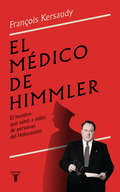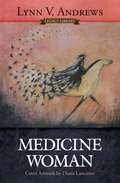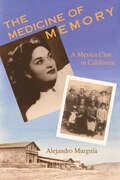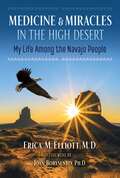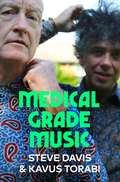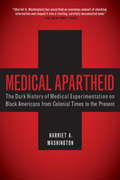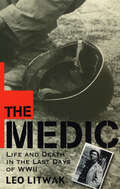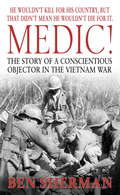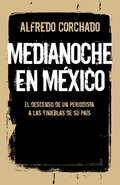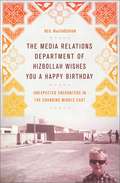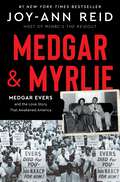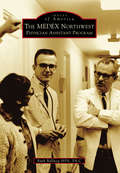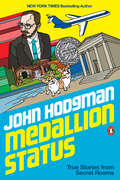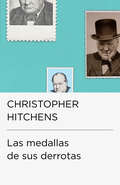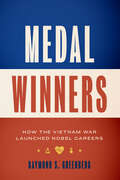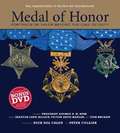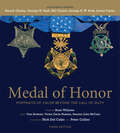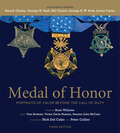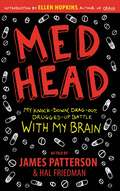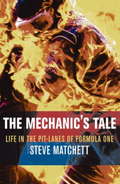- Table View
- List View
Medieval Lives: or, Eight Charismatic Men and Women of the Middle Ages
by Norman CantorVery accurate biographical segments that look like short stories
El médico de Himmler: El hombre que salvó a miles de personas del Holocausto
by François KersaudyLa verdadera historia de la lista de Kersten, un relato desconocido de terror, fanatismo, generosidad y heroísmo. Hasta las figuras más temibles de la historia tienen sus debilidades, y la de Heinrich Himmler fue sin duda su médico, cuyas manos milagrosas eran las únicas capaces de aliviar sus insoportables calambres abdominales. Felix Kersten, nacido en Estonia y formado por un maestro tibetano en Finlandia, era uno de los fisioterapeutas más prestigiosos de los años treinta, con una agenda internacional de pacientes y un buen patrimonio. En 1939, recibió la petición de atender a Himmler y, tras vencer sus dudas iniciales, se convirtió en su médico personal o, en palabras del Reichsführer, en su «Buda mágico». En lugar de recibir honorarios, pidió que le remuneraran mediante la liberación de judíos y combatientes de la resistencia. Todos conocemos a Oskar Schindler, que salvó a mil judíos durante la Segunda Guerra Mundial. Pero sabemos mucho menos de la hazaña de Kersten y, sin embargo, el Congreso Judío Mundial estableció en 1947 que este hombre había salvado en Alemania a «unos cien mil prisioneros de distintas nacionalidades, entre ellos sesenta mil judíos, arriesgando su vida», una cifra sin duda subestimada. Para seguirle los pasos a Kersten, François Kersaudy, gran especialista en la Segunda Guerra Mundial, se ha sumergido en diarios, notas y declaraciones en seis lenguas de los principales protagonistas, y emplea todo este material para narrar de un modo admirable esta trama sin un ápice de ficción. La crítica ha dicho: «Kersten no alcanzó una gloria similar a la de Schindler. ¿Por qué? Esta obra -rigurosa, minuciosa, implacable- le otorga un reconocimiento tardío».Le Point «Increíble pero cierto. Kersaudy conoce los misterios del régimen nazi como la palma de su mano, y le ofrece la consagración histórica a estehéroe a la vez grandioso y modesto».Le Figaro
Medicine Woman (Medicine Woman Series)
by Lynn V. AndrewsThe first in the late Lynn Andrews&’s widely popular and visionary Medicine Woman series, this book will encourage you to find your own sacred feminine power.Join Lynn V. Andrews in her pivotal book Medicine Woman, following her journey as an American Indian art collector turned shaman initiate. While visiting an art gallery in Beverly Hills, Lynn sees an image of a rare American Indian basket, which immediately captivates her and haunts her dreams. Upon calling the gallery the following day, she finds that it has mysteriously disappeared. Through a series of serendipitous events, Lynn eventually finds herself in the wilderness of Manitoba to locate a Cree woman named Agnes Whistling Elk, who is said to know the location of the sacred marriage basket and could help Lynn retrieve it. But once up north, Lynn finds more than she bargained for. The evil shaman Red Dog has stolen the marriage basket from Agnes. Agnes asks fellow wise woman Ruby Plenty Chiefs to help her teach Lynn their sacred ways before she attempts to steal it back. From there, Lynn is instructed to become a huntress, invite her wolf-self forward to better serve her on her mission, and to learn to embrace her own sacred medicine. Will Lynn find the feminine power within herself in time to face and defeat Red Dog once and for all?
Medicine Wheel for the Planet: A Journey Toward Personal and Ecological Healing
by Jennifer GrenzA personal journey of bringing together Western science and Indigenous ecology to transform our understanding of the human role in healing our planetI used to be an ecologist. . . . Now, I am a community gatherer, working to help bring healing beyond just the land. I am a story-listener. I am a storyteller. I am a shaper of ecosystems. I work on bringing communities together, in circle, to listen to each other. A farm kid at heart, and a Nlaka&’pamux woman of mixed ancestry, Dr. Jennifer Grenz always felt a deep connection to the land. However, after nearly two decades of working as a restoration ecologist in the Pacific Northwest, she became frustrated that despite the best efforts of her colleagues and numerous volunteers, they weren&’t making the meaningful change needed for plant, animal, and human communities to adapt to a warming climate. Restoration ecology is grounded in an idea that we must return the natural world to an untouched, pristine state, placing humans in a godlike role—a notion at odds with Indigenous histories of purposeful, reciprocal interaction with the environment. This disconnect sent Dr. Grenz on a personal journey of joining her head (Western science) and her heart (Indigenous worldview) to find a truer path toward ecological healing. In Medicine Wheel for the Planet, building on sacred stories, field observations, and her own journey, Dr. Grenz invites readers to share in the teachings of the four directions of the medicine wheel: the North, which draws upon the knowledge and wisdom of elders; the East, where we let go of colonial narratives and see with fresh eyes; the South, where we apply new-old worldviews to envision a way forward; and the West, where a relational approach to land reconciliation is realized. Eloquent, inspiring, and disruptive, Medicine Wheel for the Planet circles around an argument that we need more than a singular worldview to protect the planet and make the significant changes we are running out of time for.
The Medicine of Memory: A Mexica Clan in California
by Alejandro MurguíaAn American Book Award winner&’s creative memoir &“traces his own family's history, as well as the long story of Hispanics in America . . . Spirited writing&” (Library Journal). People who live in California deny the past, asserts Alejandro Murguía. In a state where what matters is keeping up with the current trends, fads, or latest computer gizmo, no one has the time, energy, or desire to reflect on what happened last week, much less what happened ten years ago, or a hundred. From this oblivion of memory, he continues, comes a false sense of history, a deluded belief that the way things are now is the way they have always been. In this work of creative nonfiction, Murguía draws on memories—his own and his family&’s reaching back to the eighteenth century—to (re)construct the forgotten Chicano-indigenous history of California. He tells the story through significant moments in California history, including the birth of the mestizo in Mexico, destruction of Indian lifeways under the mission system, violence toward Mexicanos during the Gold Rush, Chicano farm life in the early twentieth century, the Chicano Movement of the 1960s, Chicano-Latino activism in San Francisco in the 1970s, and the current rebirth of Chicano-Indio culture. Rejecting the notion that history is always written by the victors, and refusing to be one of the vanquished, he records, and draws us into, his own California history.
Medicine in Translation: Journeys with My Patients
by Danielle OfriFor two decades, Dr. Danielle Ofri has cared for patients at Bellevue, the oldest public hospital in the country and a crossroads for the world's cultures. In Medicine in Translation, she introduces us, in vivid, moving portraits, to the patients she has known. They have braved language barriers, religious and racial divides, and the emotional and practical difficulties of exile in order to access quality health care. Sharing their journeys with them over the years, Danielle has witnessed some of their best and worst moments, and come to admire their resilience and courageous spirit. Danielle introduces us to her patients: Samuel Nwanko, who was brutally attacked by a Nigerian cult in his homeland and is attempting to create a new life in America; Jade Collier, an Aussie who refuses to let a small thing like a wheelchair keep her from being a homegrown ambassador to New York City; Julia Barquero, a Guatemalan woman who migrated to the States to save her disabled son but cannot obtain the lifesaving heart transplant she needs because she is undocumented. We meet a young Muslim woman threatened at knifepoint for wearing her veil, and the spitfire Señora Estrella, one of Danielle's many Spanish-speaking patients, whose torrent of words helps seal Danielle's resolve to improve her own Spanish, an essential skill in today's urban hospitals. And so she, her husband, and their two young children and seventy-five-pound dog relocate to Costa Rica, where they discover potholes the size of their New York City apartment, a casual absence of street signs or even street names, tangy green-skinned limon dulce dangling in the playground, and sudden rains surging over the craggy edges of roadside ditches. Ultimately, Danielle experiences being a patient in a foreign country when she gives birth to their third child, a "Costarricense" girl. With controversy over immigrants in our society escalating, and debate surrounding health-care reform becoming increasingly urgent, Ofri's riveting stories about her patients could not be more timely. Living and dying in the foreign country we call home, they have much to teach us about the American way, in sickness and in health.
Medicine and Miracles in the High Desert: My Life among the Navajo People
by Erica M. Elliott• Details the author&’s time living with the Navajo people as a teacher, sheepherder, and doctor and her profound experiences with the people, animals, and spirits • Shows how she learned the Navajo language to bridge the cultural divide • Reveals the miracles she witnessed, including her own miracle when the elders prayed for healing of a tumor on her neck • Shares her fearsome encounters with a mountain lion and a shape-shifting &“skin walker&” and how she fulfilled a prophecy by returning as a doctor In 1971, Erica Elliott arrived on the Navajo reservation as a newly minted schoolteacher, knowing nothing about her students or their culture. After a discouraging first week, she almost leaves in despair, unable to communicate with the children or understand cultural cues. But once she starts learning the language, the people begin to trust her, welcoming her into their homes and their hearts. As she is drawn into the mystical world of Navajo life, she has a series of profound experiences with the people, animals, and spirits of Canyon de Chelly that change her life forever.In this compelling memoir, the author details her time living with the Navajo, the Diné people, and her experiences with their enchanting land, healing ceremonies, and rich traditions. She shares how her love for her students transformed her life as well as the lives of the children. She reveals the miracles she witnessed during this time, including her own miracle when the elders prayed for healing of a tumor on her neck. She survives fearsome encounters with a mountain lion and a shape-shifting &“skinwalker.&” She learns how to herd sheep, make fry bread, and weave traditional rugs, experiencing for herself the life of a traditional Navajo woman.Fulfilling a Navajo grandmother&’s prophecy, the author returns years later to serve the Navajo people as a medical doctor in an underfunded clinic, delivering numerous babies and treating sick people day and night. She also reveals how, when a medicine man offers to thank her with a ceremony, more miracles unfold. Sharing her life-changing deep dive into Navajo culture, Erica Elliott&’s inspiring story reveals the transformation possible from immersion in a spiritually rich culture as well as the power of reaching out to others with joy, respect, and an open heart.
The Medicean Succession
by Gregory MurryIn 1537, Florentine Duke Alessandro dei Medici was murdered by his cousin and would-be successor, Lorenzino dei Medici. Lorenzino's treachery forced him into exile, however, and the Florentine senate accepted a compromise candidate, seventeen-year-old Cosimo dei Medici. The senate hoped Cosimo would act as figurehead, leaving the senate to manage political affairs. But Cosimo never acted as a puppet. Instead, by the time of his death in 1574, he had stabilized ducal finances, secured his borders while doubling his territory, attracted an array of scholars and artists to his court, academy, and universities, and, most importantly, dissipated the perennially fractious politics of Florentine life. Gregory Murry argues that these triumphs were far from a foregone conclusion. Drawing on a wide variety of archival and published sources, he examines how Cosimo and his propagandists successfully crafted an image of Cosimo as a legitimate sacral monarch. Murry posits that both the propaganda and practice of sacral monarchy in Cosimo's Florence channeled preexisting local religious assumptions as a way to establish continuities with the city's republican and renaissance past. In "The Medicean Succession," Murry elucidates the models of sacral monarchy that Cosimo chose to utilize as he deftly balanced his ambition with the political sensitivities arising from existing religious and secular traditions.
Medical Grade Music
by Steve Davis Kavus TorabiThe story of two outsiders and obsessives whose collision prompted an evangelistic alliance on the furthest frontiers of underground music.Steve Davis first met Kavus Torabi - guitarist with Gong, Guapo, Cardiacs and Knifeworld - in the mid-2000's at a gig by French underground rock legends Magma. Over the next few years, this unlikely duo's shared affinity for visionary psychedelic music would become the foundation of not only a firm friendship, but also the most infectiously inclusive broadcasting style since the much-mourned death of John Peel. In their weekly radio shows and a one-of-a-kind live DJ roadshow which included a legendary appearance at Glastonbury, Steve and Kavus mapped out a musical landscape of rare enchantment, where the only passport needed was a pair of open ears. No-one, least of all Davis and Torabi themselves, was expecting the 6-time former World Snooker champion and a British-Iranian underground rock musician to become one of the most trusted brands in British alternative music.As Steve and Kavus were starting to get to grips with the challenge of their newfound status, events took a further unexpected turn. Suddenly they found themselves in a band together. And not just any band ... as two thirds of Britain's (if not the world's) leading harmonium, guitar and analogue synth power-trio (with Michael J.York of Coil)The Utopia Strong, the two friends found themselves plunging into a vortex of spontaneous compositional excitement. How Steve and Kavus pulled this off is just one of the many questions MEDICAL GRADE MUSIC will try to answer. Part sonic memoir, part Socratic dialogue, part gonzo mission to the heart of what makes music truly psychedelic this book is the first work of joint autobiography to ever trace the evolution of a life-changing friendship through the discographies of Gentle Giant and Voivod. From the chip-shops of Plumstead to the the wildest shores of Plymouth's nineties thrash scene. it's a funny and fearless buddy movie of the soul, with a soundtrack that will make your eyes bleed.
Medical Apartheid: The Dark History of Medical Experimentation on Black Americans from Colonial Times to the Present
by Harriet A. WashingtonNATIONAL BOOK CRITICS CIRCLE AWARD WINNER • The first full history of Black America&’s shocking mistreatment as unwilling and unwitting experimental subjects at the hands of the medical establishment. No one concerned with issues of public health and racial justice can afford not to read this masterful book."[Washington] has unearthed a shocking amount of information and shaped it into a riveting, carefully documented book." —New York TimesFrom the era of slavery to the present day, starting with the earliest encounters between Black Americans and Western medical researchers and the racist pseudoscience that resulted, Medical Apartheid details the ways both slaves and freedmen were used in hospitals for experiments conducted without their knowledge—a tradition that continues today within some black populations.It reveals how Blacks have historically been prey to grave-robbing as well as unauthorized autopsies and dissections. Moving into the twentieth century, it shows how the pseudoscience of eugenics and social Darwinism was used to justify experimental exploitation and shoddy medical treatment of Blacks. Shocking new details about the government&’s notorious Tuskegee experiment are revealed, as are similar, less-well-known medical atrocities conducted by the government, the armed forces, prisons, and private institutions. The product of years of prodigious research into medical journals and experimental reports long undisturbed, Medical Apartheid reveals the hidden underbelly of scientific research and makes possible, for the first time, an understanding of the roots of the African American health deficit. At last, it provides the fullest possible context for comprehending the behavioral fallout that has caused Black Americans to view researchers—and indeed the whole medical establishment—with such deep distrust.
The Medic: Life and Death in the Last Days of WWII
by Leo LitwakLeo Litwak was a university student when he joined the Army to fight in World War II, "a na've, callow eighteen-year-old son prepared to join other soldier boys being hauled off to war." In 1944 he found himself in Belgium, in the middle of the waning European war, a medic trained to save lives but often powerless to do much more than watch life slip away. It was hard fighting that took Litwak and his rifle company into the heart of Germany at the close of the war. But Litwak learned there was more to war than fighting, more to understand than maps and ammunition. In the final months of the war, he watched the men in his company tenderly serve food at a Passover seder for a dozen brutalized Jewish women newly liberated from slavery. He watched those same men torture and execute defenseless German soldiers. He fell in love at the Moulin Rouge in a scene straight out of a Toulouse-Lautrec painting. The men in his company were dreamers, thieves, friends, killers, revolutionaries, and heroes. They were the men of their time: sometimes brave, sometimes compassionate, sometimes cruel, sometimes loving, usually scared. They were held together by loyalty, only to be scattered by the war's end. The Medic is the gritty, wise, bighearted, and unflinching account of one man's quest to find sense in war and its aftermath.
Medic!: The Story of a Conscientious Objector in the Vietnam War
by Ben Sherman"On the firing range during the third week of Advanced Individual Training, I put down the handgun I had been assigned and stood back from the shooting podium. The sergeant barked something barely intelligible about six years in Leavenworth Federal Prison for refusing a direct order. I repeated that I wasn't going to train myself to kill anybody. Like falling dominoes, every soldier on the range stopped to turn and look at me. The sergeant called me a coward. I said again that I wasn't going to shoot the pistol. . . " In August 1968, Ben Sherman - then an eighteen year old college sophomore - was drafted, yet another Midwestern boy called to serve his country in the rice paddies of Vietnam. After his attempt for conscientious objector status was refused by the draftboard, Sherman distinguished himself almost immediately upon entering the military: he refused to fire a weapon. Instead, he told his superior officers that he was willing to serve in any capacity that would not require him to carry a gun. Within a few short weeks he found himself in swamps of Vietnam, working as a combat medic. From his start in the morgue, cleaning the bodies of fallen soldiers before they were sent home for burial, to operating on dying men while under front line fire, Sherman's story captures the sounds, smells, and terror of Vietnam as experienced by so many American soldiers who ended up in Vietnam without wanting to be there. Written with a rare combination of humor, honesty,and intelligence, Medic offers a glimpse into a world where unrelenting pressure and unbearable circumstances were common-place, where heroes fell on the battlefield daily, and where one man struggled to keep his conscience clear in the face of unspeakable horror.
Medianoche en México
by Alfredo CorchadoEs medianoche en México, 2007. El periodista, Alfredo Corchado recibe una llamada telefónica de su fuente principal para informarle que hay un plan para asesinarlo por parte de un poderoso capo. Pronto averigua que lo quieren matar porque uno de sus artículos en el Dallas Morning News afectó los sobornos que los narcotraficantes entregan a policías, militares y funcionarios del gobierno mexicano. Así comienza el viaje en espiral de un hombre que busca descifrar la compleja situación del país mientras lucha por salvar su vida. A pesar de recorrer un camino de múltiples encrucijadas, desigualdad y violencia extrema, Corchado, "infectado con la enfermedad incurable del periodismo", no se resigna a abandonar la esperanza en tiempos turbulentos. Ahora el líder del brutal cártel que lo perseguía, el Z-40 está detenido, pero la historia no ha terminado de escribirse.
The Media Relations Department of Hizbollah Wishes You a Happy Birthday: Unexpected Encounters in the Changing Middle East
by Neil MacfarquharWith his counterintuitive sense since his boyhood in Qadhafi's Libya that the Middle East, despite all the bloodshed in its recent history, is a place of warmth, humanity, and generous eccentricity, Neil MacFarquhar introduces a cross-section of unsung, dynamic men and women pioneering political and social change. The author interacts with Arabs and Iranians in their every day lives, removed from the violence we see constantly, yet wrestling with the region's future.
Medgar and Myrlie: Medgar Evers and the Love Story That Awakened America
by Joy-Ann ReidBy MSNBC's Joy-Ann Reid, a triumphant work of biography that repositions slain Civil Rights pioneer Medgar Evers at the heart of America's struggle for freedom, and celebrates <p><p> Myrlie Louise Beasley met Medgar Evers on her first day of college. They fell in love at first sight, married just one year later, and Myrlie left school to focus on their growing family. <p><p> Medgar became the field secretary for the Mississippi branch of the NAACP, charged with beating back the most intractable and violent resistance to black voting rights in the country. Myrlie served as Medgar’s secretary and confidant, working hand in hand with him as they struggled against public accommodations and school segregation, lynching, violence, and sheer despair within their state’s “black belt.” They fought to desegregate the intractable University of Mississippi, organized picket lines and boycotts, despite repeated terroristic threats, including the 1962 firebombing of their home, where they lived with their three young children. <p><p> On June 12, 1963, Medgar Evers became the highest profile victim of Klan-related assassination of a black civil rights leader at that time; gunned down in the couple’s driveway in Jackson. In the wake of his tragic death, Myrlie carried on their civil rights legacy; writing a book about Medgar’s fight, trying to win a congressional seat, and becoming a leader of the NAACP in her own right. <p><p> In this groundbreaking and thrilling account of two heroes of the civil rights movement, Joy-Ann Reid uses Medgar and Myrlie’s relationship as a lens through which to explore the on-the-ground work that went into winning basic rights for Black Americans, and the repercussions that still resonates today. <p> <b>New York Times Bestseller</b>
MEDEX Northwest Physician Assistant Program, The (Images of America)
by Ruth Ballweg MPA PA-CThe MEDEX Northwest Physician Assistant Program was created at the University of Washington in 1968 as one of the nation's first physician assistant (PA) programs. A joint project of the Washington State Medical Association and the University of Washington School of Medicine, MEDEX was designed to meet the needs of overworked physicians in rural communities. As envisioned by MEDEX founder Dr. Richard A. Smith, "Physician Assistants were created by physicians, for physicians." Initially, all MEDEX students were former military corpsmen returning from Vietnam. Based on their extensive clinical experience, they were well accepted by doctors and their patients. Dr. Richard Smith was a former Peace Corps physician and leader of the federal project to desegregate the US hospital "system" as a requirement for Medicare reimbursement. Dr. Smith's founding principles for MEDEX included a collaborative model for community and practitioner involvement--the framework for the MEDEX Program throughout its 45-year history.
Medallion Status: True Stories from Secret Rooms
by John Hodgman“[An] affecting and hilarious meditation on fame and prestige as seen through the lens of an airline loyalty program.” —The AV ClubA hilarious and honest new book in which John Hodgman, New York Times bestselling author of Vacationland, leaves vacation behind and gets back to work as a still somewhat famous person . . . and then loses his jobAfter spending most of his twenties pursuing a career as a literary agent, John Hodgman decided to try his own hand at writing. Following an appearance to promote one of his books on The Daily Show, he was invited to return as a contributor. This led to an unexpected and, frankly, implausible career in front of the camera that has lasted to this very day, or at least until 2016.In these pages, Hodgman explores the strangeness of his career, speaking plainly of fame, especially at the weird, marginal level he enjoyed it. Through these stories you will learn many things that only John Hodgman knows, such as how to prepare for a nude scene with an oboe, or what it feels like to go to a Hollywood party and realize that you are not nearly as famous as the Property Brothers, or, for that matter, those two famous corgis from Instagram. And there are stories about how, when your television gig is canceled, you can console yourself with the fact that all of that travel that made your young son so sad at least left you with a prize: platinum medallion status with your airline.Both unflinchingly funny and deeply heartfelt, Medallion Status is a thoughtful examination of status, fame, and identity--and about the way we all deal with those moments when we realize we aren't platinum status anymore and will have to get comfortable in that middle seat again.
Las medallas de sus derrotas (Colección Endebate #Volumen)
by Christopher HitchensEl papel de Winston Churchill en la Segunda Guerra Mundial le garantizó un lugar destacado entre los grandes líderes del siglo XX. Hitchens, el gran disidente de todo, demuestra en este ensayo cuánto hay de real en su historia, y cuánto de construcción interesada de un mito. Ya mucho antes de morir, Winston Churchill se había convertido en un personaje de la Historia. En este iluminador ensayo Hitchens lanza su incisiva mirada sobre la construcción de ese mito y lo que explica sobre la necesidad humana de creer en causas elevadas y héroes que las defiendan.
Medal Winners: How the Vietnam War Launched Nobel Careers
by Raymond S. GreenbergAs the ground war in Vietnam escalated in the late 1960s, the US government leveraged the so-called doctor draft to secure adequate numbers of medical personnel in the armed forces. Among newly minted physicians’ few alternatives to military service was the Clinical Associate Training Program at the National Institutes of Health. Though only a small percentage of applicants were accepted, the elite program launched an unprecedented number of remarkable scientific careers that would revolutionize medicine at the end of the twentieth century. Medal Winners recounts this overlooked chapter and unforeseen byproduct of the Vietnam War through the lives of four former NIH clinical associates who would go on to become Nobel laureates. Raymond S. Greenberg traces their stories from their pre-NIH years and apprenticeships through their subsequent Nobel Prize–winning work, which transformed treatment of heart disease, cancer, and other diseases. Greenberg shows how the Vietnam draft unintentionally ushered in a golden era of research by bringing talented young physicians under the tutelage of leading scientists and offers a lesson in what it may take to replicate such a towering center of scientific innovation as the NIH in the 1960s and 1970s.
Medal Winners: How the Vietnam War Launched Nobel Careers
by Raymond S. GreenbergAs the ground war in Vietnam escalated in the late 1960s, the US government leveraged the so-called doctor draft to secure adequate numbers of medical personnel in the armed forces. Among newly minted physicians’ few alternatives to military service was the Clinical Associate Training Program at the National Institutes of Health. Though only a small percentage of applicants were accepted, the elite program launched an unprecedented number of remarkable scientific careers that would revolutionize medicine at the end of the twentieth century. Medal Winners recounts this overlooked chapter and unforeseen byproduct of the Vietnam War through the lives of four former NIH clinical associates who would go on to become Nobel laureates. Raymond S. Greenberg traces their stories from their pre-NIH years and apprenticeships through their subsequent Nobel Prize–winning work, which transformed treatment of heart disease, cancer, and other diseases. Greenberg shows how the Vietnam draft unintentionally ushered in a golden era of research by bringing talented young physicians under the tutelage of leading scientists and offers a lesson in what it may take to replicate such a towering center of scientific innovation as the NIH in the 1960s and 1970s.
Medal of Honor: Portraits of Valor Beyond the Call of Duty
by Peter CollierContemporary portraits of 144 recipients of the Medal of Honor by National Book Award nominee Peter Collier. The Medal of Honor recipients in the book fought in conflicts from World War II to Afghanistan, serving in every branch of the armed services. All were interviewed specifically for this book. First published on Veterans Day 2003, this New York Times bestseller has now been updated and augmented to include new essays plus: Letters from all living presidents; a foreword by Brian Williams; and profiles of Sergeant Giunta and Sergeant Petry, who were awarded the Medal of Honor after the publication of the first edition. There are also essays by Tom Brokaw, Senator John McCain, and Victor Davis Hanson. The Medal of Honor recipients in the book fought in conflicts from World War II to Afghanistan, serving in every branch of the armed services. All images described. Second edition.
Medal of Honor: Enhanced Version
by Peter CollierOn October 25, 2010, Staff Sergeant Salvatore Giunta became the first living person since the Vietnam War to receive the United States’ highest military decoration, and both he and Sergeant Leroy Petry (the second inductee) rightly take their place in the pages of this third edition of Medal of Honor: Portraits of Valor Beyond the Call of Duty. The book includes 144 contemporary portraits of recipients by award-winning photographer Nick Del Calzo and profiles by National Book Award nominee Peter Collier. First published on Veterans Day 2003, this New York Times bestseller has now been updated and augmented to include new essays plus:• Letters from all living presidents • A foreword by Brian Williams • Profiles of Sergeant Giunta and Sergeant Petry There are also essays by Tom Brokaw, Senator John McCain, and Victor Davis Hanson, and a multimedia DVD with historic footage and recipients’ first-person reflections. The Medal of Honor recipients in the book fought in conflicts from World War II to Afghanistan, serving in every branch of the armed services.
Medal of Honor: Third Edition
by Peter Collier Nick Del CalzoOn October 25, 2010, Staff Sergeant Salvatore Giunta became the first living person since the Vietnam War to receive the United States’ highest military decoration, and both he and Sergeant Leroy Petry (the second inductee) rightly take their place in the pages of this third edition of Medal of Honor: Portraits of Valor Beyond the Call of Duty. The book includes 144 contemporary portraits of recipients by award-winning photographer Nick Del Calzo and profiles by National Book Award nominee Peter Collier. First published on Veterans Day 2003, this New York Times bestseller has now been updated and augmented to include new essays plus:• Letters from all living presidents • A foreword by Brian Williams • Profiles of Sergeant Giunta and Sergeant Petry There are also essays by Tom Brokaw, Senator John McCain, and Victor Davis Hanson, and a multimedia DVD with historic footage and recipients’ first-person reflections. The Medal of Honor recipients in the book fought in conflicts from World War II to Afghanistan, serving in every branch of the armed services.
Med Head: My Knock-down, Drag-out, Drugged-up Battle with My Brain
by James Patterson Hal FriedmanCory Friedman woke up one morning when he was five years old with the uncontrollable urge to twitch his neck. From that day forward his life became a hell of irrepressible tics and involuntary utterances, and Cory embarked on an excruciating journey from specialist to specialist to discover the cause of his disease. Soon it became unclear what tics were symptoms of his disease and what were side effects of the countless combinations of drugs. The only certainty is that it kept getting worse. Simply put: Cory Friedman's life was a living hell. This is the true story of Cory and his family's decades-long battle for survival in the face of extraordinary difficulties and a maddening medical establishment. It is a heart-rending story of struggle and triumph with a climax as dramatic as any James Patterson thriller.
The Mechanic's Tale
by Steve MatchettEssential reading for anyone interested in life behind-the-scenes at Formula One.Formula One Grand Prix mechanic Steve Matchett takes the reader on a compelling journey through his life in the pit-lane, from his beginnings as a young apprentice, through his time at Ferrari and BMW to his later success with Benetton. He gives eye-witness views of the great drivers, including Michael Schumacher, Nigel Mansell, Alain Prost and Ayrton Senna. He also talks of key Benetton personalities, and explains how the team was transformed into a strong, competitive organisation, winning three World Championships. His determination and frustration in trying - and eventually succeeding - to break into the high-pressure world of Formula One leaps off the page.

